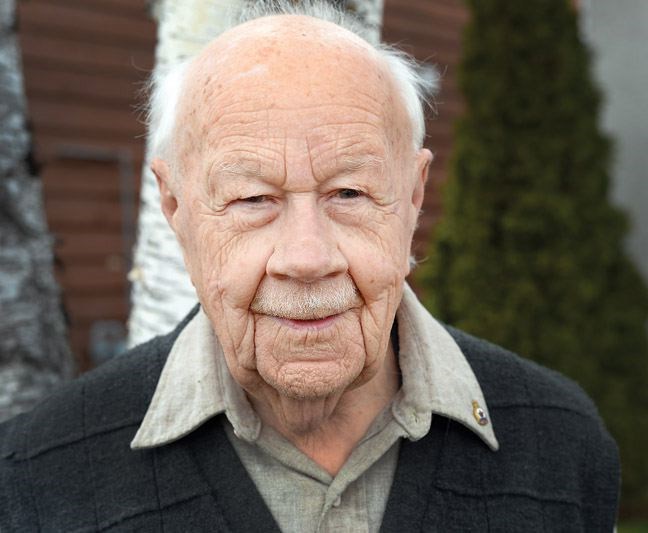Tucked away in the Prince George home Gordon Talbot has owned since 1966, the Second World War veteran has stored a simple brown-covered booklet.
Inside, the slightly yellowed pages record memories of Talbot's time as a prisoner of war.
The 1954 submission to the War Claims Commission has preserved a period of his life as details grow softer with age.
"I have spent nine years trying to forget my prisoner days and I am now reasonably well contented," Talbot wrote. "I feel quite certain that there are many who lived through that nightmare with me who will never completely recover, mentally or physically."
Now 94, Talbot's timeline of events is fading but he is still able to speak hours on end of battles, of trudging between camps and of his escape from captivity.
In 2015, seated on his living room couch there is no pain in his recalling his time at war.
He said simply: "It's nasty."
Talbot escaped and was recaptured twice from before his third and final push for freedom.
None of this is recorded in his war claim that begins on June 7, 1944 in Normandy when the Allies fell to German attack.
"Eventually with ammunition exhausted, shelled, mortared and machine gunned from allied and enemy sources, our position was overrun and the 10 survivors, all ranks, were captured."
Talbot, a private, was captured with nine other men. He would have been in his early twenties, having volunteered at 19 to join the war.
He was an excellent shot and trained other snipers during the war - among other roles.
He was a natural, his daughter Karen Talbot said, having spent time on a Nova Scotia trapline since he was eight years old.
But that didn't matter on that day in Normandy.
"Of these 10 men, only six lived to see nightfall," wrote Talbot.
Thus started a harrowing journey of at least a year in captivity. Talbot couldn't recall the dates, but his report has him a prisoner until at least April 1945.
"They moved and moved and moved," Talbot said of his captors, who pushed prisoners by foot and train from camp to camp.
Just days later on a trip by foot, Talbot recalled facing friendly fire by American P-51 Mustang fighter planes which, "mistaking us for the enemy, straffed us," he wrote.
Talbot said he could hear the slight sound overhead before the bombs fell.
"I know the buzz," said Talbot, so he dove, saving himself and a guard.
"It was really incredible, it never touched him and it never touched me," Talbot said, recalling how the man had said to him: "You didn't have to do that."
Forty-eight died from that attack, but the captors pushed on, abandoning the wounded to the roadside.
The prisoners ate nothing for the first four or five days. The first ration - a quarter loaf of bread.
Later, a loaf was shared between eight men to supplement the pint of cabbage stew.
Despite being forbidden to help, Talbot reported how the Senegalese and Moroccans would find ways of getting food to the men.
"(T)hose that were well enough suffered constantly from hunger," he wrote.
The prisoners also suffered from lice, hunger, dysentery and thirst.
After three months on the move by train and foot between several camps, Talbot had his first bath.
There, he learned the tip that he should eat charcoal to counteract the dysentery.
Their captors told them "we were not prisoners of war, therefore they could do with us as they wished."
In Rennes, France Talbot recalled the "filthiest" camp he'd ever been in, with little water and sleeping quarters "polluted with vermin, both fleas and lice."
Sometime in the fall of 1944, bleeding into spring 1945, Talbot and the prisoners were put to work in coal mines near the village of Falkenau, Germany.
By January, more and more men were getting sick from the poor rations and seven-day-a-week work schedule.
One man had yellow jaundice and another had sores over half of his body, complete with scabs.
Another lost all of his hair, including his eyelashes.
"The German authorities were extremely apathetic and indifferent to human suffering," Talbot wrote.
In his living room, some 70 years later, Talbot seemed to differentiate between the regular German soldiers and Nazi hardliners. He told of how some would let him know when the supervisor was coming, so he could break from work.
The majority of the German miners, "were sympathetic, but fear of the authority and the few party members among them was sufficient to prevent the slightest show of sympathy publicly," he wrote.
Guards told Talbot if he tried to escape a third time, he would be killed. Even so, Talbot said he wasn't scared.
Karen said he's the kind of man who did what had to be done.
So one night, close to the end of the war, when the prisoners were on the move again Talbot found his chance. They were housed in an empty barn for the night, somewhere near Czechoslovakia.
Under the dark of night, he jumped from a window. Waiting for him was a guard, who Talbot knew wasn't a very good shot.
The way Talbot told it now, the man missed and he and at least one other prisoner escaped.
Along the way they were helped by Czech partisans, who directed them to trails and let them know when German soldiers were near.
In the end, Talbot met up with American soldiers.
Karen said he's quick to correct the record that suggests he was rescued in any way.
"He did it all on his own," said Karen.



